#salesforce marketing cloud
Text

youtube
#bussinessgrowth#salesforce#salesforce crm#what is salesforce#salesforce tutorial#salesforce training#salesforce admin#salesforce explained#salesforce developer#salesforce certification#salesforce tutorial for beginners#learn salesforce#what is salesforce crm#salesforce lightning#salesforce sales cloud#salesforce introduction#salesforce for beginners#crm salesforce#salesforce now#salesforce demo#salesforce help#salesforce marketing cloud#salesforce setup#Youtube
1 note
·
View note
Text
Data Modelling in Salesforce Marketing Cloud
Data modelling is perhaps one of the most crucial factors contributing to a robust digital marketing strategy, with Salesforce Marketing Cloud (SFMC) offering itself as an enterprise-grade platform allowing businesses to fully leverage their data. Good data modelling in SFMC can dramatically optimize your marketing operations and improve customer interaction like no other email software. In this article, I will discuss the importance of data modelling in Salesforce Marketing Cloud, how to do data modelling, and best practices.
What Is Salesforce Marketing Cloud?
Salesforce Marketing Cloud is an all-in-one cloud marketing platform that empowers customers to run B2B or B2C-oriented promotions through various channels such as email, mobile, and social networks. It allows marketers to run tailored, data-backed campaigns that speak directly to customers and deliver outstanding conversion rates. One of the key aspects of it is to be able to manage and model data.
Salesforce Marketing Cloud Data Modelling Explained
A data model is a framework that defines how information and business rules are stored, organized, and accessed within a system.
Why is Data Modelling Important in Salesforce Marketing Cloud?
Structured Data: It ensures that data is organized so that it becomes easy to fetch and use.
More Individualized Campaigns: A well-organized data model enables marketers to create more detailed customer profiles, which can be used in highly individualized campaigns.
Efficiency: Data modelling eliminates redundancy and makes data processing & analysis more efficient.
Scalable: A strong data model lends itself to scalability, meaning your marketing operations can grow with the business without having to start over.
Key Components of Salesforce Marketing Cloud Data Modelling
Data Extensions: A data extension is a primary building block for storing and managing data in the Marketing Cloud. In this way, they resemble database tables given each extension can contain different types of data (e.g., customer details, purchase history, and engagement stats).
Attribute Groups and Data Designer: Marketing Cloud includes an interface called Data Designer, which organizes your data extensions into attribute groups. This is a visual editing tool that allows you to define relationships between fields and create the data model in an easy-to-understand manner.
Contact Builder: Contact Builder is another important tool responsible for building a centralized view of each customer by integrating segmentation data from various sources. Marketers can use it to define and manage relationships between various data entities, so the underlying model also shows in detail for a typical customer journey.
Journey Builder: Journey Builder hooks into the data model to deliver personalized customer journeys for a best-in-class marketing automation service offering. Journey Builder uses this structured data to make triggers to fire off actions and communications based on customer behaviour and preferences, thereby improving campaign effectiveness.
Salesforce Marketing Cloud Data Modelling Best Practices
Define Clear Objectives: You must have your objectives set up before you go and model the data as part of the Salesforce Marketing Cloud Implementation. Having a clear expectation of what you want your data to do will be the cornerstone on which your model structure and organization is built.
KISS (Keep It Simple, Stupid): Complex data models can be hard to deal with and maintain. Aim for simplicity by identifying key data points and relationships that directly impact your marketing objectives. Complexity in a ternary expression will cause confusion, and bugs too.
Consistent Data Definitions: Use the same columns in all three tables. Standardize data definitions throughout the enterprise. Along those lines are naming conventions, types of data formats to be used, and the different ways in which you measure an effect. Standardization ensures uniformity, minimizes discrepancies, and allows for easier data integration and analysis.
High-Quality Data: High-quality data is the cornerstone of effective modelling, so deliver that high-quality data. Set up data validation so the data which enters your system is accurate, complete, and up-to-date. And you can avoid data quality issues over time through established data cleansing routines.
Utilize Automation: Automation tools in Salesforce Marketing Cloud to automate data management processes. Solve routine operational tasks like data imports, updates, and syncing automatically, so there is time for your strategic activities.
Partner with Salesforce Implementation Partners: Partnering with Salesforce Implementation partners is a great way to gain access to industry-specific expertise and knowledge. These partners have deep experience in configuring and tuning Salesforce Marketing Cloud from your data model to be robust and scalable. They serve on your committee and it speeds yours up as well as helps you avoid the pitfalls of the less principled approaches.
Advanced Data Modelling Techniques
Segmentation and Targeting: Advanced data models enable complex segmentation and targeting strategies. Marketers can craft relevant campaigns that speak to very specific segments of the audience by filtering out (segmenting) customers into groups based on a variety of criteria ranging from demographics, behaviour, or preferences — generally placing users in several different buckets.
Predictive Analytics: By using predictive analytics in your data model, you can predict how customers are going to act and understand trends. Predictive models use historical data analysis to predict future actions in order so businesses can act proactively implement marketing strategies and resource allocation.
Powering Your Data Model with External Data Sources: Enhancing your data model with external data sources can provide a more comprehensive view of your customers. Integrate data from social media, third-party analytics providers, and what not to enrich customer profiles, and also to enhance the effectiveness of your marketing campaigns.
Real-Time Data Processing: The ability to process large volumes of real-time data is necessary in today's digital era where everything happens at breakneck speed. Incorporating real-time data feeds into your model enables you to react instantly to customer behaviours, making your marketing messages more timely and relevant!
Conclusion
Data modelling is one of the core parts of Salesforce Marketing Cloud that helps you with your successful digital marketing strategy. Structured and organized data can boost personalization, optimize efficiency, and drive scalable growth for businesses. Application of tools such as Data Extensions, Attribute Groups, and Contact Builder within Journey Builder as well as deployment of best practices in addition to advanced techniques can be leveraged to construct a rich data model for greater marketing benefits. And working with Salesforce Implementation partners can even enhance your strategy and obtain the support necessary to gain the most out of Salesforce Marketing Cloud. Even in an era where digital marketing is constantly changing, a well-designed data model has remained central to the success of any data-driven MarTech stack.
#salesforce#technology#crm#business#salesforce implementation services#salesforce implementation partners#salesforce marketing cloud
0 notes
Text
Elevate Your Marketing Efforts with Expert Salesforce Marketing Cloud Implementation
Explore our Salesforce Marketing Cloud Implementation Services to enhance your marketing strategies. As a trusted Salesforce partner, we ensure seamless implementation, enabling you to harness the full potential of Salesforce Marketing Cloud. Visit our website to discover how our expertise can drive your marketing success. Choose excellence with Salesforce Marketing Cloud Implementation Services.
0 notes
Text
Salesforce Marketing Cloud Services
Codleo is a Salesforce Marketing Cloud Consultant that provides salesforce marketing-cloud integration, Setup & customization. Get our salesforce marketing cloud services to raise your business and brand value.
#Salesforce Marketing Cloud#Salesforce Marketing Cloud Services#Marketing Cloud Consultants#Marketing Cloud Implementation#Marketing Cloud Implementation In India#Marketing Cloud Support#Marketing Cloud Support in India#Marketing Cloud Support in USA#Marketing Cloud Staffing#Marketing Cloud Staffing IN India#Marketing Cloud Staffing in USA
0 notes
Text
Salesforce Marketing Cloud
In today's digital age, effective marketing strategies are essential for businesses to thrive and stay ahead of the competition. With the evolution of technology, traditional marketing methods have shifted towards more innovative and data-driven approaches. Salesforce Marketing Cloud stands out as a comprehensive solution empowering businesses to create personalized, engaging, and impactful marketing campaigns across multiple channels. In this guide, we'll explore what Salesforce Marketing Cloud is, its key components, benefits, and who can leverage its potential.
What is Salesforce Marketing Cloud?
Salesforce Marketing Cloud is a powerful platform designed to help businesses engage with their customers in a personalized and meaningful way. It provides a suite of tools and capabilities to manage customer journeys, create targeted campaigns, and analyze marketing performance, all within a single integrated platform. Essentially, it enables organizations to deliver the right message to the right audience at the right time, across various channels such as email, social media, mobile, and advertising.
Key Components of Salesforce Marketing Cloud:
Email Studio:
Allows businesses to create, automate, and personalize email marketing campaigns, delivering relevant content to customers inboxes.
2. Social Studio:
Enables businesses to listen, engage, and publish content across social media platforms, fostering meaningful interactions with customers.
3. Journey Builder:
Helps businesses design and automate customer journeys, from initial engagement to conversion and beyond, through personalized interactions across multiple channels.
4. Advertising Studio:
Allows businesses to create and manage targeted advertising campaigns across digital channels, reaching customers with relevant ads based on their behavior and preferences.
5. Mobile Studio:
Enables businesses to create and send personalized mobile messages, such as SMS and push notifications, to engage customers on their preferred devices.
6. Analytics Builder:
Provides insights into marketing performance, customer behavior, and campaign effectiveness, empowering businesses to optimize their strategies for better results.
What is Salesforce Marketing Cloud Used For?
Personalization:
Salesforce Marketing Cloud enables businesses to deliver personalized experiences to customers, based on their preferences, behavior, and interactions with the brand. This personalization fosters stronger connections and drives higher engagement and conversions.
2. Automation:
With features like Journey Builder and Email Studio, businesses can automate marketing processes, saving time and resources while ensuring timely and relevant communications with customers throughout their journey.
3. Multi-channel Marketing:
Salesforce Marketing Cloud allows businesses to reach customers across multiple channels, including email, social media, mobile, and advertising, ensuring a consistent and cohesive brand experience across touchpoints.
4. Data-driven Insights:
By leveraging advanced analytics capabilities, businesses can gain valuable insights into customer behavior, campaign performance, and marketing ROI. These insights enable data-driven decision-making and continuous optimization of marketing strategies for better results.
5. Scalability:
Whether you're a small startup or a large enterprise, Salesforce Marketing Cloud is scalable to meet your growing needs. It can accommodate businesses of all sizes and industries, helping them scale their marketing efforts effectively.
What Does Marketing Cloud Include?
Salesforce Marketing Cloud consists of two types of modules:
Studios:
Manage content and specific marketing channels, eg. Email Studio.
Builders:
Manage data and campaign automation, eg. Journey Builder.
Who Should Use Marketing Cloud?
Salesforce Marketing Cloud is ideal for businesses of all sizes and industries looking to elevate their marketing efforts and drive business growth. Whether you're a B2C or B2B organization, Marketing Cloud can help you create personalized experiences, automate marketing processes, and gain actionable insights to enhance your marketing strategy. From marketing professionals and digital marketers to sales teams and customer service representatives, anyone involved in customer engagement and relationship management can benefit from Salesforce Marketing Cloud.
In conclusion, Salesforce Marketing Cloud is a game-changer for businesses seeking to deliver personalized, impactful marketing campaigns that resonate with their audience. With its comprehensive suite of tools, advanced capabilities, and scalability, Marketing Cloud empowers organizations to unlock the full potential of their marketing efforts and drive meaningful results in today's competitive landscape.
0 notes
Text
Take the Benefits of Salesforce Marketing Cloud Services For Your Business
With Salesforce Marketing Cloud Services, it provides marketers a single platform to manage all their marketing efforts. It manages marketing campaigns to lead generation, track customer journeys, and much more. Salesforce Marketing Cloud Services effectively manages customer relationships. If you want to know more about the benefits of Salesforce Marketing Cloud Services for your business, then you can go to our blog.
#Salesforce Marketing Cloud Services#Salesforce Marketing Cloud#Salesforce Integration Marketing Cloud
0 notes
Text
How does Salesforce marketing cloud resolve some primary marketing challenges?

Are you grappling with the complexities of modern marketing? Discover how Salesforce Marketing Cloud emerges as a formidable solution, tackling key marketing challenges head-on. From enhancing customer engagement to streamlining campaign management, the platform's robust features empower businesses to navigate the dynamic landscape of digital marketing with finesse. Find out exactly what Salesforce Marketing Cloud brings to the table, revolutionizing the way businesses connect with their audience. Read now to learn more about how the salesforce marketing cloud can help you resolve marketing challenges.
#salesforce#cymetrix software#cymetrix salesforce#marketing#marketing cloud#salesforce marketing cloud#marketing challenges#cymetrix
0 notes
Text
#salesforce#future of marketing#salesforce integration#salesforce marketing#salesforce marketing cloud#salesforce marketing cloud experts
0 notes
Text
Exploring Email Sending Techniques in Marketing Cloud
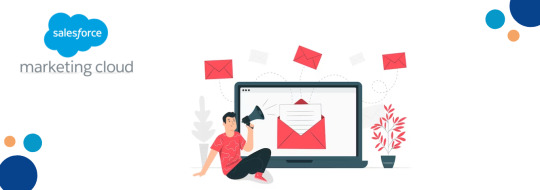
As your familiarity with Salesforce Marketing Cloud grows, you will realize that there are numerous paths to achieve identical results. Sending emails within the Marketing Cloud framework is a prime illustration. Even seasoned users may occasionally face difficulty when selecting from among the available options. However, you are in for a valuable resource as we will be leading you through the process of determining which method to utilize and when to do so.
This blog will explore diverse methods for sending emails via Marketing Cloud.
User-Initiated Sends, or Manual Sends
Triggered Sends or Action based sends
Journey builder Sends
Automation Studio
A/B Testing
1. User-Initiated Sends:
When a user triggers an email manually, it is known as a user-initiated send. This occurs in situations like sending one-off emails to customers, conducting campaign tests, and handling newsletter scenarios. To perform a user-initiated send, access the Interactions section in Email Studio, and choose "User-Initiated Sends" from the dropdown menu.
Click "Create" and input details like Name, External Key, and Description. In the mandatory "Message" field, choose an email template from Content Builder, Shared Content, or All Shared Content. Opting for an email template will automatically populate the Subject line. You can also manually input or modify the subject. Additionally, you have the option to pick a Send to Deliverability Send List with the preferred frequency. The Send Classification should be set as Default Commercial or Default Transactional based on organizational needs. For recipients, choose from the dropdown and select Data Extension or Lists. If necessary, you can also designate an Exclusion List. Instead of desired recipients, you can opt for Test Lists, along with Message Properties and User Tracking of your choice.

2. Triggered Emails:
Triggered emails are initiated by a customer, prospect, or subscribers specific action. Triggered sends are employed in scenarios like sending a thank you email upon form completion or submission. They can also be activated through the SOAP API.
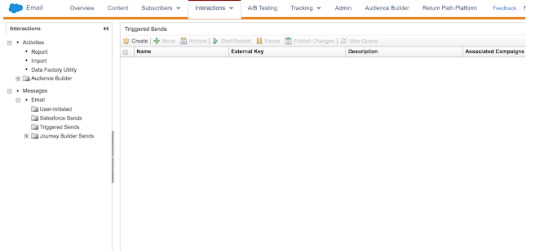
Additional methods for sending emails through Marketing Cloud include Journey Builder and Automation Studio.
3. Journey Builder:
You can manually initiate a journey or schedule email sends within the journey. According to your preferred schedule, this can be achieved by referring to the Journey Data Extension, API event, Cloud Page, or Salesforce Data.
It has two touchpoints:
Single Send Journey: With Single Send Journeys, sending emails becomes a seamless three-step process: pick the email, select the target audiences Data Extension (apply filters as needed), and schedule the send. This simplicity is matched by automatic email tracking synchronization with Salesforce CRM, eliminating the need to organize Data Extensions in particular folders for sync assurance.
Multi-Step Journey: The multi-step journey is the ultimate solution for anything requiring multiple email sends. This tool empowers you to craft straightforward multi-channel experiences. These journeys adapt to diverse paths using branching logic guided by customer interactions and data cues. Set emails to dispatch automatically on specific days or intervals. The Journey Builder canvas helps track customer advancement. Navigate to: Journey Builder > New Journey > multi-Step > Build. Email configurations in Journey Builder entail the automatic creation of corresponding triggered send activities for seamless management.
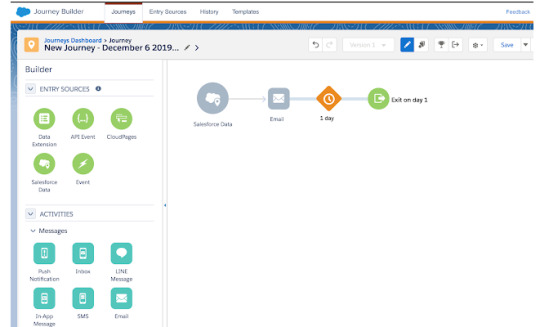
4. Automation Studio:
Within Marketing Cloud, Automation Studio empowers you to send emails at varying intervals, such as hourly, daily, weekly, or monthly. One of the activities in the automation studio is sending email activity.
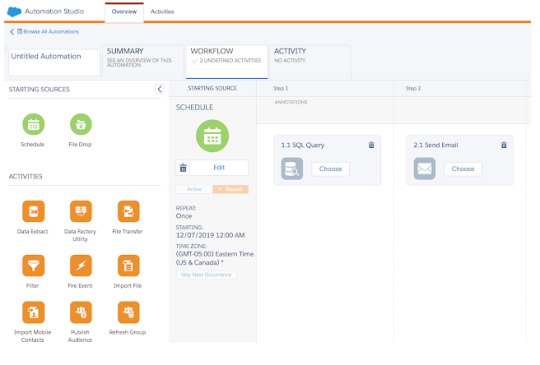
Send Email Activity: The option exists to set up a send email activity within a multi-step automation or as an independent action.
When configuring a Send Email Activity, a corresponding Send Definition is established, which is versatile across various automation. This approach is valuable for tasks like scheduling automated reports dispatched via email.
5. A/B Testing:
A/B Testing is a valuable approach. As you know, it involves sending emails while manipulating various variables to optimize outcomes. The A/B Testing functionality within Email Studio empowers you to do precisely that. You have at your disposal six distinct test types: subject lines, preheaders, sender names, send dates/times, content areas, and even entirely different email versions. During setup, you will specify the target audience and the percentage you intend to subject to your experimentation. You will also define the criteria for declaring a winner based on click-through or open rates.
Summing up
Explore multiple ways to send emails in Marketing Cloud, including User-Initiated Sends, Triggered Sends, Journey Builder, and Automation Studio. Tailor email campaigns to manual triggers or customer actions and utilize diverse scheduling options. These methods provide a versatile toolkit for effective email communication.
0 notes
Text
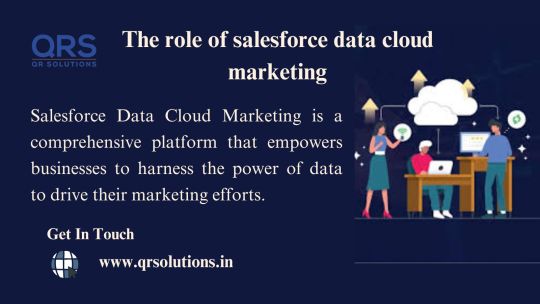
In today's data-driven business landscape, companies are constantly seeking innovative ways to better understand their customers and drive more personalized, effective marketing strategies. Salesforce Data Cloud Marketing is a powerful tool that has emerged as a game-changer in this regard. This blog will explore the crucial role that Salesforce Data Cloud Marketing plays in helping businesses make informed decisions and create more meaningful customer experiences.
Understanding Salesforce Data Cloud Marketing
Salesforce Data Cloud Marketing is a comprehensive platform that empowers businesses to harness the power of data to drive their marketing efforts. It leverages the vast and diverse data resources within the Salesforce ecosystem, including data from Salesforce Marketing Cloud, Commerce Cloud, and Sales Cloud. This data can be used to gain insights into customer behavior, preferences, and engagement, ultimately helping businesses create more personalized and effective marketing campaigns.
Customer Insights for Informed Decision-Making
One of the key roles of Salesforce Data Cloud Marketing is providing businesses with a deeper understanding of their customers. By aggregating data from multiple sources, it allows companies to create a unified customer profile. This profile includes information about customer interactions, purchase history, demographics, and more. With this comprehensive view, businesses can make data-driven decisions about their marketing strategies, product development, and customer service efforts.
Personalization and Targeted Marketing
Personalization is a cornerstone of modern marketing. Salesforce Data Cloud Marketing enables companies to create highly personalized marketing campaigns that resonate with their target audience. By using customer data to segment audiences, businesses can tailor their messaging, offers, and content to cater to individual preferences. This not only improves customer engagement but also enhances the likelihood of conversions.
Enhanced Customer Engagement
Salesforce Data Cloud Marketing allows companies to engage with customers in a more meaningful and relevant way. By using data to understand the customer journey, businesses can send the right message at the right time, through the right channel. This results in a higher level of customer satisfaction, as customers feel that a company truly understands their needs and desires.
Data Security and Compliance
Data security and compliance are paramount in today's digital world. Salesforce Data Cloud Marketing places a strong emphasis on data security and compliance with regulations like GDPR and CCPA. This ensures that customer data is handled responsibly and that businesses are protected from potential legal risks.
Improved Marketing ROI
Effective marketing is not just about creating campaigns; it's about optimizing them. Salesforce Data Cloud Marketing provides insights into which marketing strategies are working and which are not. By analyzing the data, businesses can make adjustments and refine their marketing efforts, leading to a higher return on investment.
Conclusion
Salesforce Data Cloud Marketing has become an invaluable tool for businesses looking to thrive in the digital age. By providing a 360-degree view of customer data, enabling personalization, enhancing engagement, and ensuring data security and compliance, it empowers companies to make informed decisions and drive successful marketing campaigns.
As the business landscape continues to evolve, data-driven marketing will remain a vital component of success. Salesforce Data Cloud Marketing is poised to play an even greater role in helping businesses navigate this complex landscape, deliver more personalized experiences, and build lasting customer relationships. So, whether you're a small startup or a large enterprise, consider harnessing the power of Salesforce Data Cloud Marketing to drive your business forward.
#Salesforce Data Cloud#Salesforce Data Cloud Marketing#Customer data management#Data integration#Targeted marketing#Marketing automation#Sales and marketing alignment#Salesforce Marketing Cloud
0 notes
Text
Salesforce Marketing Cloud Services and Solutions
Find the best salesforce marketing cloud services and solutions at NSIQ INFOTECH. We offer salesforce marketing cloud services to help growing companies improve the effectiveness of their marketing activities. Our team of experts helps you create personalized and data-driven marketing with the power of salesforce marketing cloud. Contact us today!
#salesforce marketing cloud services#salesforce marketing cloud solution#best salesforce marketing cloud services#salesforce marketing cloud#NSIQ INFOTECH
0 notes
Text
Salesforce Marketing Cloud is a powerful platform for multi-channel marketing automation and personalization. Implementing it successfully requires a clear vision, seamless integration with existing systems, and a focus on data quality. Staff training, personalization, campaign automation, budgeting, security, KPIs, and ROI assessment are also crucial. Technical proficiency, team capacity, strategic ownership, user adoption, and choosing the right implementation partner are additional challenges to consider for a successful implementation. Continuous improvement and partnering with experts can help maximize the benefits of Salesforce Marketing Cloud.
0 notes
Text
Want more customers from your clicks? Dive into the magic of Salesforce with GetOnCRM Solutions! We've covered you, from knowing your customers better to smart marketing moves. Let's make your business shine!
#salesforce#crmsolutions#salesforce marketing cloud#customer success#salesforce partner#technology#getoncrm
0 notes
Text
#salesforce#cloud#salesforce sales cloud#salesforce commerce cloud#salesforce marketing cloud#salesforce cloud#salesforce consulting partner#cloud consultants#salesforce crm#salesforce service cloud
0 notes
Text
Salesforce marketing automation with the help of Cloud builds and manages customer journeys and has various built-in marketing components
0 notes
Text
How Integrating Salesforce Marketing Cloud and Sales Cloud is Beneficial for you?
Are you torn between choosing Salesforce Marketing Cloud or Sales Cloud🌐? You can opt for a brilliant solution by integrating Salesforce Marketing and Sales Clouds. 🚀 Check out this blog to dive deep into both platforms and discover the immense benefits of merging Marketing Cloud with Sales Cloud for businesses.
0 notes